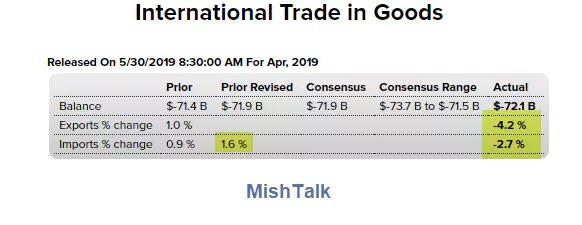While investors and the financial press had anticipated that President Trump might open up a second front in his global trade war by antagonizing the EU and Japan with Section 232 auto tariffs. And last night, the president did instigate another trade fight, but it wasn’t the one they had expected.
Trump stunned Wall Street and sent stock futures reeling by announcing via tweet his plans to slap tariffs on all Mexican imports early next month over the country’s failure to stop hundreds of thousands of migrants from illegally entering the US.
But while investors are temporarily preoccupied with the latest trade-war twist, Chinese officials are apparently seizing on the opportunity to inspire more FUD in markets that are already oversaturated.
To wit, the SCMP reported Friday that a breakthrough on the trade stalemate between China and the US during the G-20 Summit in Osaka late next month is unlikely, attributing the comment to Dai Xianglong, the former head of the PBOC.
A breakthrough in the current stalemate between China and the US is unlikely when Chinese President Xi Jinping meets his American counterpart at the G20 summit in Japan next month, a former Chinese central bank chief said on Friday.
“Leaders of China and the US will meet late next month in Japan and I hope there will be positive news [from the meeting],” said Dai Xianglong, former governor of the People’s Bank of China, at a seminar on China-US technology development in Beijing.
“However, [any breakthrough] would not be easy because it is actually very difficult for the US side to form a powerful and systematic correction that can right the wrongs made by [President] Trump,” he said adding he had no direct knowledge of the meeting arrangement.
The report was published just hours before Beijing’s retaliatory tariffs on $60 billion in American goods are set to take effect. Dai is now a vice-chairman of the China Center for International Economic Exchanges, a Beijing-based think tank.
Once again, Beijing is pushing back against optimistic trade-war jawboning by both President Trump and Vice President Mike Pence. And if President Xi and senior party officials are angry now, Pence’s plans to make a sweeping speech to mark the 30th anniversary of the Tiananmen Square massacre probably won’t help de-escalate the situation.
But the SCMP report wasn’t all. As Beijing’s trade-war rhetoric increasingly focuses on its plans to retaliate for the blacklisting of Huawei, Global Times editor Hu Xijin tweeted Friday that China is planning to implement “major retaliatory measures” against US companies over the blacklisting of Huawei.
Based on what I know, China will take major retaliative measures against the US placing Huawei and other Chinese companies on Entity List. This move indicates Beijing will not wait passively and more countermeasures will follow.
— Hu Xijin 胡锡进 (@HuXijin_GT) May 31, 2019
Though Hu didn’t go into detail, the threat was swiftly confirmed when Ministry of Commerce spokesman Gao Feng announced during a press briefing that China would set up an “unreliable entities” list – China’s own blacklist for foreign enterprises, organizations and individuals, Bloomberg reports.
Organizations and individuals who don’t obey market rules, violate contracts and block, cut off supply for non-commercial reasons or severely damage the legitimate interests of Chinese companies will be added to the list, Gao said, adding that more details would be available “soon.” US investors can now add plans to target companies that cut ties with Huawei, as well as potentially other major US tech firms, to the list of potential trade-war retaliation, alongside Beijing’s threats to curb the export of rare-earth metals.
via ZeroHedge News http://bit.ly/2HMFErl Tyler Durden
 Ma is an almost-horror movie that almost works. It’s basically an atmospheric creepfest enlivened by a few torture-porn jolts toward the end, and if Octavia Spencer seems oddly ensconced in it, we can probably credit her presence to a long friendship with director Tate Taylor, in whose 2011 hit The Help she earned a best-supporting-actress Oscar.
Ma is an almost-horror movie that almost works. It’s basically an atmospheric creepfest enlivened by a few torture-porn jolts toward the end, and if Octavia Spencer seems oddly ensconced in it, we can probably credit her presence to a long friendship with director Tate Taylor, in whose 2011 hit The Help she earned a best-supporting-actress Oscar.
